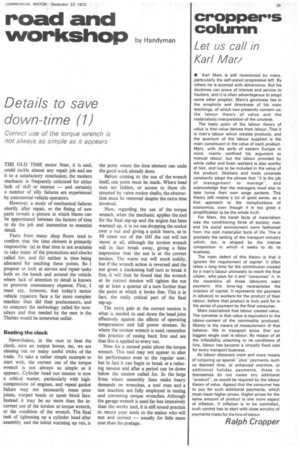cropper's column
Page 37

If you've noticed an error in this article please click here to report it so we can fix it.
Let us call in Karl Mar/
• Karl Marx is still reverenced by many, particularly the self-styled progressive left. By others he is scorned with abhorrence. But his doctrines can prove of interest and service to hauliers, and it is often advantageous to adopt some other prophet. Marx's greatness lies in the simplicity and directness of his main teachings, of which two presently concern us: the labour theory of value and the materialistic interpretation of the universe.
The basic point of the labour theory of value is that value derives from labour. That it is man's labour which creates products, and the quantum of the labour supplied is the main constituent in the value of each product. Marx, with the serfs of eastern Europe in mind, mainly confined his argument to manual labour, but the labour provided by white collar and brain workers is also worthy of hire, and has to be included in the value of the product, Workers and trade unionists constantly adopt the phrase that "it is the job of management to manage", and acknowledge that the managers need also to take home their own wage packets. This theory still retains a lot of good sense, as a first approach to the complications of economics, even though it is too great a simplification to be the whole truth.
For Marx, the harsh facts of materialism was the conditioning force of society; man and his social environment were fashioned from the cold materialist facts of life. This is precisely the setting of the transport industry which, too, is shaped by the intense competition in which it seeks to do its business.
The main defect of this theory is that it ignores the requirement of capital. It often takes a long time for the contribution created by a man's labour ultimately to reach the final citizen, who pays for it and "consumes" it. In the meantime all those labourers want payment; this time-lag necessitates the creation of capital. It represents the payment in advance to workers for the product of their labour, before that product is truly paid for in the sense of payment by the final consumer.
Marx maintained that labour created value. The converse is that value is equivalent to the labour-content of the commodity produced. Money is the means of measurement of that balance. We in transport know that our biggest single cost is labour. By reason of all the inflexibility attaching to its conditions of hire, labour has become a virtually fixed cost for every transport business.
As labour discovers more and more means of conjuring up special "plus" payments, such as deemed time, or enhanced overtime, or additional holiday payments, these in themselves do not create any additional "product", as would be required by the labour theory of value. Agreed that the consumer has to pay for such additional payments, which must mean higher prices. Higher prices for the same amount of product is one more aspect of inflation. If inflation is to be controlled, such control has to start with close scrutiny of payments made for the hire of labour.
Ralph Cropper












































































